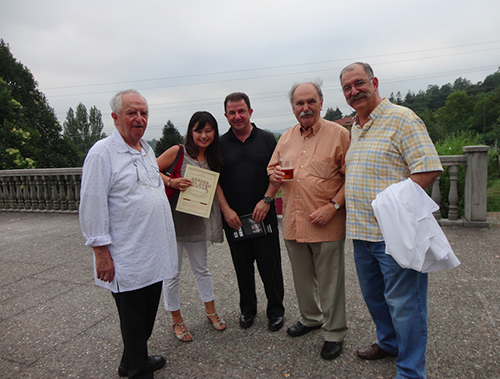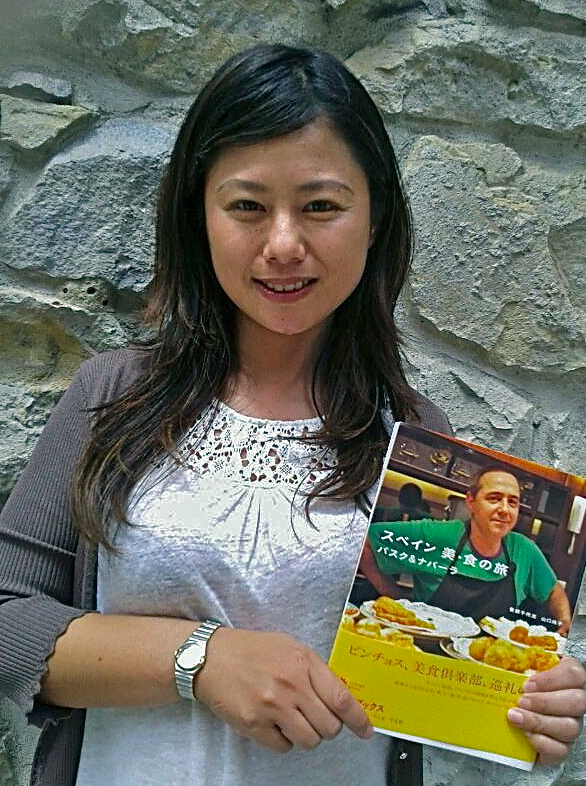by June Yamaguchi.
I arrived in Donostia-San Sebastian on a sunny summer day, one of those days that just doesn’t get any better. I enjoyed the beautiful beach with crystal clear water just like a mirror, almost without a single wave; the pleasant walk through clean streets with buildings from times gone by and bars loaded with pintxos, those small but amazing delicacies to enjoy.
That’s how I fell in love with this city, and that’s why I’m staying here forever.
This city certainly welcomed with open arms a girl coming from the “country of the rising sun” since it was seen as an exotic country at that time, fifteen years ago.
I soon started to teach Japanese and occasionally worked as a translator and even gladly helped the Basque media several times, which showed great interest in the arrival of this new neighbour with slanted eyes.

With four icons of Basque gastronomy: Arzak, Berasategi, Irizar and Subijana
Currently focused on gastronomy, I am coordinator for the Japanese press and work as a cultural and gastronomic guide. My main job is to accompany the Japanese who visit here on trips and at meals and, in addition, to help them discover the area’s unique and typical attractions and most emblematic places. My clients include common tourists and delegations of Japanese press and TV, and my goal is to help them eat well through my explanations of Basque cuisine.
According to a report I read a few years ago, Japanese tourists are looking for cultural interest on their journey, rather than sun, beach life and parties. And although San Sebastian does not have world heritage buildings, it has a beach that everyone loves.
However, here there are many cultural references and aspects, although they are not represented as buildings like the Alhambra in Granada, for example. I’m talking about a gastronomic and culinary culture, which is deeply rooted in the traditions of Basque society.
So I explain the creations of great chefs, with or without the stars from the famous Michelin Guide, the streets filled with bars; the origin and history of the gastronomic societies, rather than explanations of Gaudí’s famous Sagrada Familia, in Barcelona, or the Gothic Cathedral in Burgos, as my colleagues do in those cities.
I also organize appointments for when Japanese journalists want to report on the Basque Country.
My colleagues often ask me, with my work as coordinator, if the Basques cause me any trouble. That question comes from the fact that in other places, even when a meeting is organized and confirmed often times it is not reliable. For example, the people do not show up at the agreed upon place of the interview or they might forget the appointment altogether, even though they’ve been reminded about it.

The author of this article at the San Fermín festival in Pamplona with Chiyoshi Sugawara, photographer for her successful book
Not the case for me; so far, Basques have never failed me. Here, there is a saying that describes this: “the word of a Basque”, while in the rest of Spain there is another saying: “words blowing in the wind”, showing how some of my colleagues from around Spain have become accustomed to unreliability.
Of course, I ran into San Sebastian discretion. Being a foreigner, people on the streets, in supermarkets or even in elevators did not greet me or say hi to me. Certainly the opposite from Madrid, or in an Andalusian city, which I had the opportunity to visit and to live in, where people greeted me and talked to me even though I could barely converse in their language.
I soon learned that this was because of shyness and discretion, much like in the case of my own compatriots. The Japanese are also very respectful of the distance between people and it is very difficult to establish an instant relationship.
Here is an example to illustrate this. Almost every day I took the same bus, from the same stop in front of my house. At that bus stop usually the same faces sat waiting each morning. However, they did not greet each other nor did they converse even about the weather. I do not remember well if I greeted them, but I am sure that they didn’t approach me in any way. One of those faces waiting at the stop was pushing a child in a stroller. The child, less than a year old, and despite his young age, already had a notion that I was a foreigner, but we exchanged gestures of good morning every day.
One day, walking down the street, I ran into that child and, to his mother’s surprise, her son smiled at me and made me the agreed upon signal. From there on, things changed: the mother began to talk to me during the short trip on the bus and I could finally officially communicate with her son. Somehow, we can say that the child baptized me and I was received by the community.
Fifteen years later, that boy no longer greets me, perhaps because of typical adolescent shyness, but his parents definitely do and stop me to chat.

June Yamaguchi with her book in Japanese on Basque gastronomy
My shy San Sebastian neighbours showed us their solidarity a few years ago, when there was a devastating earthquake in my country. It shook both, literally those who were in Japan, and those of us who were abroad at that time. It was a misfortune that really took its toll on me and I felt utterly powerless faced with the situation. Wherever I went, my neighbours of the city showed me their sympathy and concern and encouraged me with their warm thoughts, but always in a very discreet way.
We, the Japanese living in the Basque province of Gipuzkoa, organized several fundraising events to send aid to the areas affected by the earthquake and tsunami. In one of the events, a colleague came to me and told me: “Someone just put a purple colored bill in the box. Do you think it’s a 500 euro bill?”
It was indeed, and I am the one who took it to the bank to send the money. According to my colleagues it was given by a man who approached the collection box and deposited it leaving without saying a word. He certainly did not boast about making such a hefty donation nor did he ask for a receipt to claim it for his taxes.
When it comes to explaining to my people about the Basque Country where I’ve been living for more than a decade, I always say that the charm of the Basque Country is its content, the natural environment, mountains and coastline, its culture, its history of autonomy, and above all its people, the noble, discrete and hard-working people inhabiting this wonderful place.
Since I have dropped anchor here I realized right away that the incredible weather that I found on that first day was not the norm, with rain and wind being pretty common. But, despite the days of endless rains, nothing pushes me to return to my country or to look for another home.
It’s all about the content of this country, and how everyone behaves: where family, friends and citizens have welcomed me in an excellent way. I have tried to integrate into its festivals, to participate in the famous festival of the “Tamborrada” of San Sebastian on the 20th of January, showing off my traditional Basque costume at the fair of Saint Thomas, living like a “donostiarra” (citizen of San Sebastian). For this reason, the publication of the book that we have dedicated to tell the customs and cuisine of the Basque Country, is just a contribution to the affection that I have received in San Sebastian: my place in the world.
 |
June Yamaguchi is a Japanese writer and author of a successful book on Basque gastronomy |
| mendiohea@yahoo.co.jp | |






Great article! I am married to a Basque (47 years) and I must say you captured the most important aspects of the (Basque temperament)! They are the most hard-working, private people I’ve ever known. But they are so generous and fun-loving at the same time. Thank you for your kind and informative words. I traveled to Spain last year to meet my husband’s relatives in Lequeitio. Loved it there, as well as San Sebastian, Gernika, and Bilbao. Take care.
Hello June, I found your article very interesting. My husband is japanese and of course he loves gastronomy same as all his family so I thought this book would make a really good present for both, so that they learn more about my culture at the same time I learn about theirs ¿ do you know where could I find the japanese version of it?
I hope you can help me, Thank you very much!